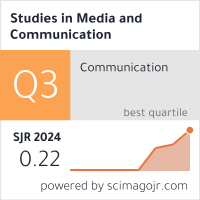Conquering Constraints and Expanding Ethos: FDR’s 1932 Commonwealth Club Address
Abstract
FDR’s Commonwealth Club Address is a well-regarded speech that suffers from a lack of critical attention by rhetorical scholars. This essay compliments previous contextual and ideological critiques of the speech by examining the rhetorical strategies Roosevelt used to enhance his ethos and overcome key constraints encountered in the summer of 1932. Hampered by the rules of the Commonwealth Club (rules requiring non-partisan speeches), the complexity of the audience and the details of his own life, Roosevelt conquered these constraints by adroitly employing strategies of ingratiation building and personae adoption. Additionally, FDR built and maintained a rhetorically consistent oeuvre that enhanced his credibility by demonstrating his reliability, stability and trustworthiness.
Full Text:
PDFDOI: https://doi.org/10.11114/smc.v3i1.760
Refbacks
- There are currently no refbacks.
Studies in Media and Communication ISSN 2325-8071 (Print) ISSN 2325-808X (Online)
Copyright © Redfame Publishing Inc.
To make sure that you can receive messages from us, please add the 'redfame.com' domain to your e-mail 'safe list'. If you do not receive e-mail in your 'inbox', check your 'bulk mail' or 'junk mail' folders.
If you have any questions, please contact: smc@redfame.com
------------------------------------------------------------------------------------------------------------------------------------------------------

